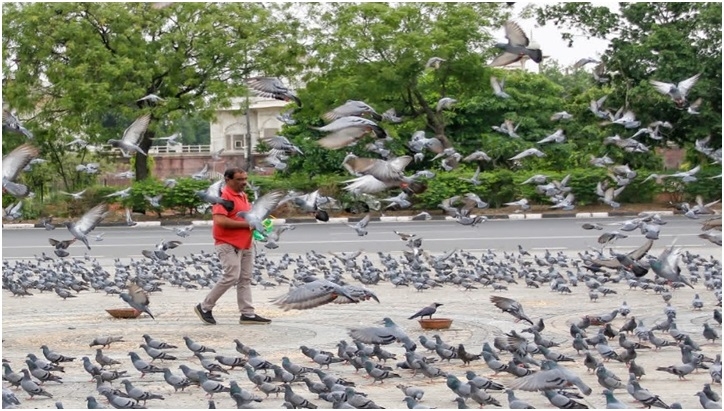Feeding Pigeons In Public ? You Could Be Contributing To Serious Health Risks

Under such conditions, there is a need for an awareness campaign among the public over the adverse effects of pigeon droppings. They should be made aware of the health risks associated with pigeon droppings.
However, the well-being of the pigeons should also be ensured. There should be designated areas for feeding the pigeons. It should be strictly ensured by the administration that they are fed in these areas.
Speaking to ETV Bharat, Dr Subhash Giri, Former Director of Lady Hardinge Medical College (LHMC), New Delhi, on Friday said, "Common health risks to humans, with exposure to pigeon droppings are particularly when their droppings dry out and become airborne, contaminating the environment. Inhalation of these leads few lung conditions."
Mentioning the health risks, he said, "The diseases associated are - Histoplasmosis, caused by inhaling spores of the fungus called Histoplasma capsulatum, which can be found in soil contaminated with bird droppings; Cryptococcosis, a fungal infection caused by Cryptococcus neoformans, which can be found in pigeon droppings; Psittacosis, a bacterial infection caused by Chlamydophila, which can be transmitted through inhalation of dust contaminated with the droppings of infected birds, including pigeons." Dr Giri added that these diseases primarily affect people with weakened immune systems and secondary infections.
The former Director of the LHMC further said pigeon droppings can trigger allergic reactions, including respiratory issues like asthma or allergic alveolitis (hypersensitivity pneumonitis), which can be a severe complication.
Dr Giri advised to avoid direct contact, wear gloves and masks when cleaning areas contaminated with pigeon droppings. He also suggested ensuring good ventilation in areas where pigeon droppings are present to reduce the concentration of airborne pathogens.
Expressing concern over the matter, BS Vohra, an environmental expert, emphasised that the government implement stricter regulations and pigeons are fed in designated areas.
"Pigeon droppings are causing significant health problems, particularly in areas where the birds are regularly fed. When pigeons fly over dried droppings or when the droppings are disturbed during cleaning, harmful particles are released into the air, leading to serious air pollution and various health issues," he told ETV Bharat.
Asserting that so far no action has been initiated in this regard, Vohra said, "The public must be made aware of the health risks associated with pigeon droppings, and the government should implement stricter regulations to ensure birds are fed only in designated remote areas."
National Green Tribunal (NGT) on the issue of pigeon droppings
Last month, the Principal Bench of the NGT issued a notice to the Government of the National Capital Territory of Delhi (GNCTD) and other concerned agencies.
A bench headed by NGT Chairperson Prakash Shrivastava issued the notice while hearing a plea of an applicant on May 29.
The applicant, a school student had said, "feeding and proliferation of pigeons leads to pigeons dropping in the footpath, pavements and traffic islands, etc, in Delhi NCR and when these feeding areas are broomed then the toxic particulars of dried droppings mix with the dust, pollute the environment and caused adverse health effect."
The applicant had also alleged that "such droppings cause serious lung diseases such as hypersensitivity pneumonitis, which causes lung scarring and breathing difficulties".
The bench noted that this raises substantial issues relating to compliance with environmental norms. The next hearing is on October 8.